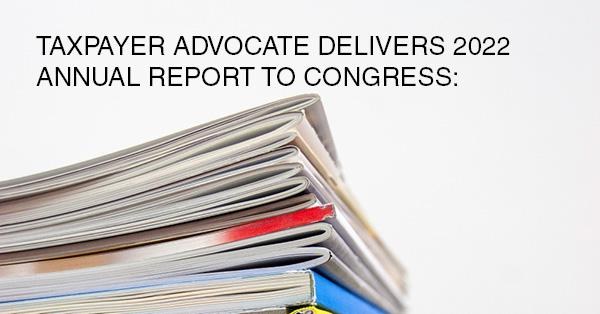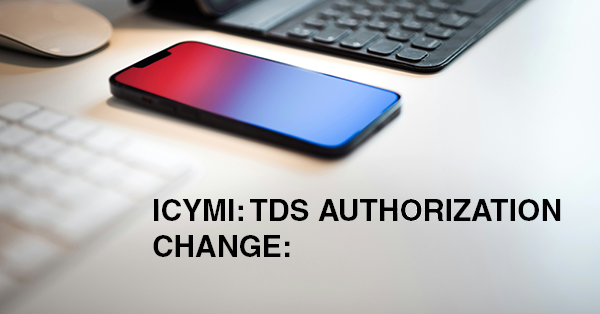TAXPAYER ADVOCATE DELIVERS 2022 ANNUAL REPORT TO CONGRESS:

National Taxpayer Advocate Erin Collins released her 2022 Annual Report to Congress, saying taxpayers and tax professionals "experienced more misery in 2022" due to paper processing delays and poor customer service. But the report also says the IRS made considerable progress in reducing the volume of unprocessed tax returns and correspondence and is poised to start the 2023 filing season in a stronger position.
“The Taxpayer Rights and Service Assessment provides the IRS, Congress, and other stakeholders with a “report card” to measure how the agency is doing in protecting and furthering taxpayer rights and service while driving voluntary compliance. This report card can be integral to the IRS’s ongoing implementation of the Taxpayer Bill of Rights (TBOR) and may be used to indicate areas where shifting resources impact the IRS’s ability to maintain a robust adherence to TBOR in practice and provide a high level of customer service. Taxpayer rights and taxpayer customer service are discrete but closely linked considerations.”
The Advocate's report assesses taxpayer service during 2022, identifies the 10 most serious problems taxpayers are experiencing in their dealings with the IRS and makes administrative and legislative recommendations to address those problems.
National Taxpayer Advocate “Purple Book”: Legislative recommendations to strengthen taxpayer rights and improve tax administration. Among them are the following:
- Amend the “Lookback Period” to allow tax refunds for certain taxpayers who took advantage of the postponed filing deadlines due to COVID-19.To be eligible to receive a tax refund, any tax payments at issue must have been paid within a “lookback period” of three years, plus the period of any extension of time to file. Absent an extension, refunds generally may not be paid more than three years beyond the tax return filing due date of April 15. TAS recommends Congress extend the lookback period for receiving refunds to align with any postponements of the filing deadline.
- Authorize the IRS to establish minimum standards for paid tax return preparers.Most taxpayers hire tax return preparers to complete their returns, and visits to preparers by Government Accountability Office and Treasury Inspector General for Tax Administration auditors posing as taxpayers, as well as IRS compliance studies, have found paid preparers make significant errors that both harm taxpayers and reduce tax compliance. Ten years ago, the IRS sought to implement minimum preparer standards, including requiring otherwise non-credentialed preparers to pass a basic competency test, but a federal court concluded the IRS could not do so without statutory authorization. TAS recommends Congress provide that authorization.
- Expand the U.S. Tax Court’s jurisdiction to adjudicate refund cases and assessable penalties.Under current law, taxpayers who owe tax and wish to litigate a dispute with the IRS must go to the U.S. Tax Court, while taxpayers who have paid their tax liability and are seeking a refund must sue in a U.S. district court or the U.S. Court of Federal Claims. Although this dichotomy between deficiency cases and refund cases has existed for decades, TAS recommends Congress give taxpayers the option to litigate both deficiency and refund disputes in the U.S. Tax Court. Due to the tax expertise of its judges, the Tax Court is often better equipped to consider tax controversies than other courts. It is also more accessible to unsophisticated and unrepresented taxpayers than other courts because it uses informal procedures, particularly in disputes that do not exceed $50,000 for one tax year or period.
- Modify the requirement that written receipts acknowledging charitable contributions must pre-date the filing of a tax return.To claim a charitable contribution, a taxpayer must receive a written acknowledgement from the donee organization before filing a tax return. For example, if a taxpayer contributes $5,000 to a church, synagogue, or mosque, files a tax return claiming the deduction on February 1, and receives a written acknowledgement on February 2, the deduction is not allowed – even if the taxpayer had credit card receipts and other documentation that fully substantiates the deduction. TAS recommends that Congress modify the substantiation rules to require reliable – but not necessarily advance – acknowledgement from the donee organization.
- Restructure the Earned Income Tax Credit (EITC) to make it simpler for taxpayers and reduce improper payments.TAS has long advocated for dividing the EITC into two credits: (i) a refundable worker credit based on each individual worker’s earned income unrelated to the presence of qualifying children and (ii) a refundable child credit. For wage earners, claims for the worker credit could be verified with nearly 100% accuracy by matching claims on tax returns against Forms W-2, reducing the improper payments rate on those claims to nearly zero. The portion of the EITC that currently varies based on family size would be combined with a child credit into a larger family credit. The National Taxpayer Advocate published a report making this recommendation in 2019, and TAS continues to advocate for it. This report contains a research study assessing alternative structures for implementing TAS’s recommendation.
- Expand the protection of taxpayer rights by strengthening the Low Income Taxpayer Clinic (LITC) program.The LITC program effectively assists low-income taxpayers and taxpayers who speak English as a second language. When the LITC grant program was established in 1998, the law limited annual grants to no more than $100,000 per clinic. The law also imposed a 100% “match” requirement (meaning a clinic cannot receive more in LITC grant funds than it is able to match on its own). The nature and scope of the LITC program has evolved considerably since 1998, and those requirements are preventing the program from providing high quality assistance to eligible taxpayers. While the recently enacted Consolidated Appropriations Act, 2023, raised the per-clinic cap to $200,000 for the current year, TAS recommends that Congress remove or substantially increase the per-clinic cap permanently and allow the IRS to reduce the match requirement to 25% where doing so would facilitate coverage for additional taxpayers.




